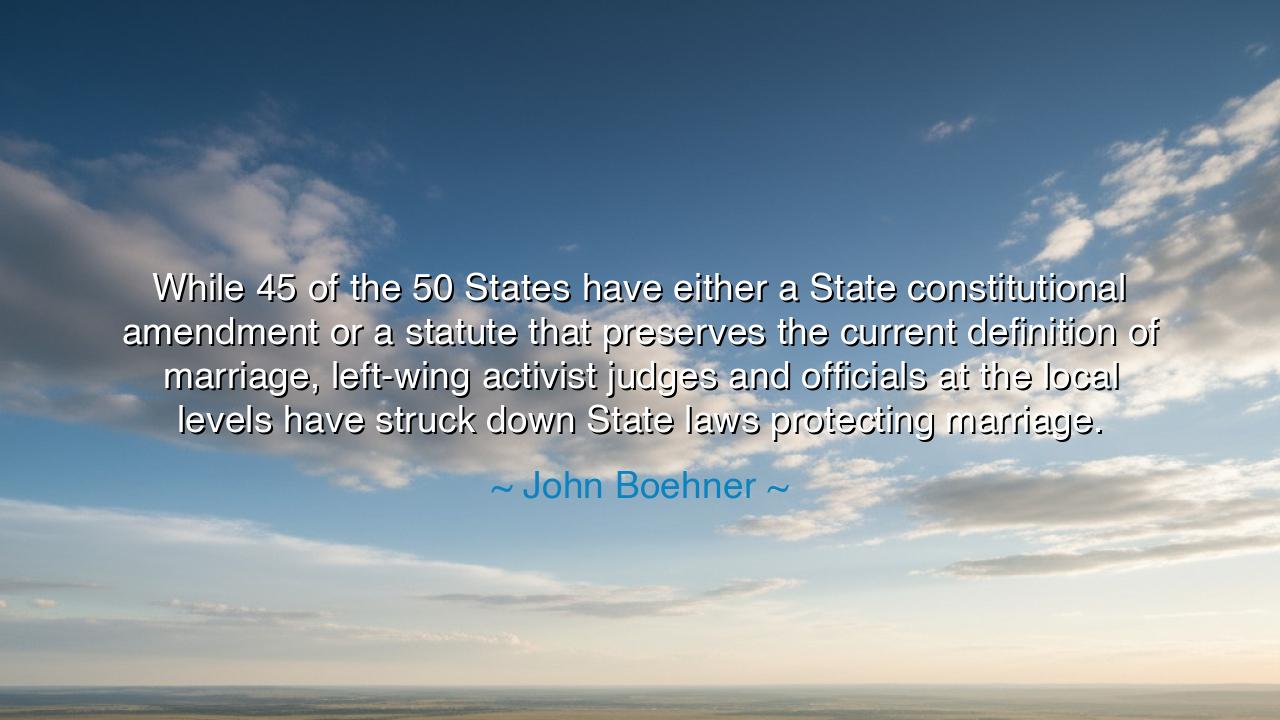
While 45 of the 50 States have either a State constitutional
While 45 of the 50 States have either a State constitutional amendment or a statute that preserves the current definition of marriage, left-wing activist judges and officials at the local levels have struck down State laws protecting marriage.






Hear the words of John Boehner, once a leader among legislators, who declared: “While 45 of the 50 States have either a State constitutional amendment or a statute that preserves the current definition of marriage, left-wing activist judges and officials at the local levels have struck down State laws protecting marriage.” These words, though steeped in the fire of their political age, rise beyond mere policy. They speak of the eternal tension between law and change, between tradition and transformation, between the will of the people and the judgment of the few. In his statement, Boehner stands as the voice of an era caught in the whirlwind of moral and social redefinition — a moment when the foundations of one of humanity’s oldest institutions trembled beneath the weight of new understanding.
In the ancient pattern of human history, there has always been a battle between the keepers of tradition and the heralds of reform. The former seek to preserve the order that has sustained them, believing stability to be the highest virtue; the latter, inspired by the flame of progress, challenge that order in pursuit of justice as they see it. Boehner’s lament arises from this ancient struggle. The definition of marriage, long rooted in the union of man and woman, had stood for millennia as a cornerstone of faith, culture, and social structure. Yet in the early years of the twenty-first century, voices rose to redefine it — to broaden its meaning, to make it reflect not only ancient covenant but modern equality. Thus began the conflict between state sovereignty and judicial intervention, between democracy and decree.
To understand his words, one must see the age in which they were spoken. In the first decade of the 2000s, many states in America passed amendments or laws affirming marriage as a bond between a man and a woman. This was not merely a political act, but a cultural declaration — a collective effort to preserve what was seen as sacred order. Yet, even as these laws were written, courts began to strike them down, citing the higher principles of constitutional equality and human rights. To Boehner and those who shared his conviction, this was not progress but usurpation — the overturning of the people’s will by unelected judges, the triumph of ideology over consensus. His words, therefore, are not only about marriage; they are about authority, about the fragile balance between the rule of law and the spirit of change.
Such moments are not new. In the days of Socrates, the laws of Athens condemned him to death for questioning the city’s moral certainties. Yet centuries later, his ideas became the seed of Western philosophy. When Martin Luther defied the authority of the Church, he was called a heretic; yet his challenge reshaped the world of faith. In every age, reform and tradition have clashed like thunder and lightning — one preserving, the other illuminating. Boehner’s cry, then, stands as the echo of countless voices who have feared that what holds civilization together may, through zeal or haste, be unmade.
Yet, from another view, history teaches that even as laws are struck down, societies grow wiser through their turmoil. The judges whom Boehner denounced saw their role not as destroyers of tradition, but as defenders of liberty — believing that love itself, regardless of form, deserved the protection once reserved for a chosen few. This, too, is an ancient impulse: the expansion of justice beyond its original boundaries. For every tradition, noble though it may be, must eventually confront the question — does it serve the spirit of humanity, or merely the habit of it? Thus, even within conflict, there lies the potential for renewal.
Still, Boehner’s warning bears a deeper resonance: that change without consent breeds division, and reform without dialogue breeds resentment. He reminds us that when transformation is forced rather than shared, nations fracture. The wise, therefore, must seek balance — to honor the heritage of the past even as they prepare the soil for the future. For if tradition anchors us, progress gives us direction; without both, we drift, either lost in nostalgia or blinded by novelty.
Let the lesson, then, be this: in matters of faith, law, and love, let no change come without understanding, and let no tradition endure without compassion. The ancients taught that justice is not a weapon but a bridge — a bond between differing hearts. Whether one stands with Boehner in defense of old laws, or with the reformers who sought new ones, both must remember that the purpose of governance is not victory, but harmony.
So, to those who live in ages of upheaval, let this truth be passed down: listen deeply before you judge, build bridges before you battle, and seek the common good before all else. For when the dust of conflict settles, what will endure is not the power of one side, but the wisdom of a people who learned to wrestle with change without destroying one another. In that struggle — between marriage and meaning, between law and love — lies the story of every civilization that has ever dared to evolve.






AAdministratorAdministrator
Welcome, honored guests. Please leave a comment, we will respond soon